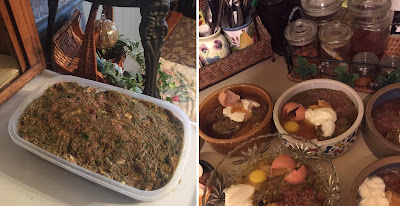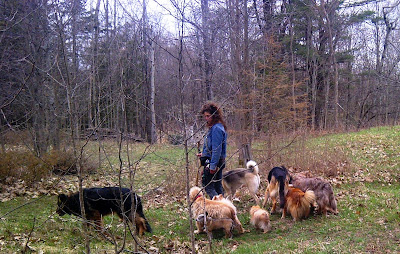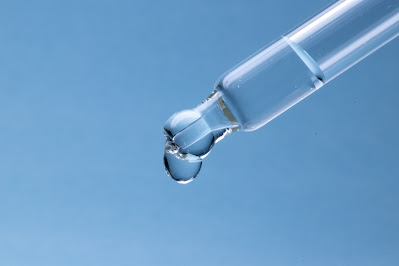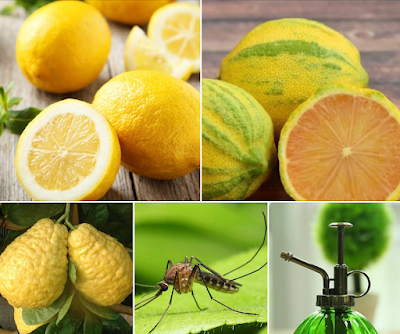TYPES OF AGGRESSION IN DOGS & HOW TO AVOID CREATING IT
The most common types of aggressive-reactive
behaviour in dogs result from the dog being...
A - Insecure,
nervous, tense, fear based reactivity.
B - Bullying,
dominating reactivity.
When these psychological conditions noted above are not addressed and resolved a dog may become:
When these psychological conditions noted above are not addressed and resolved a dog may become:
- Fearful reactive-aggressive.
- Defensive reactive-aggressive.
- Offensive reactive-aggressive.
- Fearful reactive-aggressive - backing away, trembling, low growl, whale eyes.
- Defensive reactive-aggressive - barking, bared teeth, growling, fearful body posture (lowered head, tucked tail, ears back, whale eye) and may back away.
- Offensive reactive-aggressive - barking, bared teeth, growling, offensive body posture (direct eye contact, erect ears, high tail) while moving or charging forward.
This
behaviour may be directed at animate objects such as dogs or other non-human
animals, at humans and at inanimate objects as well.
As an example most aggression in dogs occurs due to lack of
leadership in the dog’s life - in the absence of proper direction a dog may
become anxious, insecure and fearful. If dogs were
pre-wired to be aggressive rather than social there would be very few dogs left
standing. A dog in its natural state is
a social being, a pack animal with the potential inherent to get along
with others. There are very few dogs born with 'bad wiring’. When a dog
goes bad it is almost always a human who is responsible for the bad behaviour.
When
puppies are young they learn their social skills from the adult dogs in their dog family.
Now, as long as the adult dogs’ natural social state has not been negatively
disrupted by human influence the adult dogs will teach their young how to get
along without being aggressive. If you are thinking - yeah but what about the
'Alpha' - dominate dog? The 'alpha dog' theory was debunked years ago by the individual that first presented the theory - learn more in this article.
Things go wrong when we humans...
A - Separate the dog from its early socialization process
by removing the puppy from its parents and then;
B - We fail to take up the leadership role to coach
and mentor the dog in the acquisition and maintenance of social skills -
providing rules and boundaries.
In this day and age of technology and our fast paced-life we have lost an awareness of all of the ways in which we communicate. We have lost patience. We attempt to direct our dogs - we assume we know what we are doing - but most often people do not.
A dog learns aggressive-reactive behaviour because a human enables the behaviour in a dog. Either by failing to provide leadership or by actively abusing the dog. Usually when a human enables the aggression it has happened by accident - completely unintentionally.
Here are some typical
ways that dogs develop aggressive reactive behaviour…
A - Dogs that lack proper coaching and mentoring can become
insecure, anxious and fearful. When a dog is insecure it will either be
overly submissive or overly defensive. We see these same behaviours in people
as well. If you are insecure, anxious or fearful you are either going to recede
into the background or overcompensate by being a bully - it is the same for
dogs. If your dog is nervous around humans or other dogs and you are nervous
too - you tell your dog it is right to be worried. You enable the behaviour. If
your dog has been attacked in the past by another dog and you are unable to let
the past go, you enable your dog’s nervousness and aggression towards the other dog.
B - Dogs
who receive the wrong type of affection at the wrong time can become
aggressive-reactive. When you reward a dog for being in an excited state the
dog learns that being excited is good. When a little dog is insecure and starts
to react (snarl, growl, snap, bark) at a bigger dog - if you pick the little
dog up, you have just rewarded the little dog for reactive behaviour. Your dog
learns that reactive aggressive behaviour is ok.
C - Dogs
who are allowed to take-over their humans, their homes, their toys, the furniture
etc. without any rules that they can understand - these dogs can become
aggressive. The rule - they own and the human fears to intercede. The human has
inadvertently taught the dog to be a bully.
D - A dog has been abused by humans - this can
make the dog insecure and fearful - the dog will seek to protect itself. To
stop this behaviour you must help the dog gain confidence, you must show the
dog that there are other ways to navigate through life - just as you would do
for a person.
So,
aggression is normally induced by humanity. No dog wants to be bad. All dogs
want to have the opportunity to receive fair instruction, coaching and
mentoring to help them be social happy members of society - the same thing that
a child wants. Children don’t want to be bad - but when they lack the proper
guidance, just like a dog they have little choice.
When we
do not take the opportunity to correct the dog in a respectful, firm way without
anger, fear or other emotions we create psychological damage in the dog.
We miss an opportunity to change future outcomes - we make one more mistake in
the dogs’ life - we set the dog up for future failure…just as we would be doing
with a human.
The
great thing about dogs is that they are easier to psychologically rehabilitate than humans are.
Why, because dogs do not hold grudges. Because dogs
live in the moment it is easier to change a dog's 'bad habits' than it is a
human's. Humans carry grudges, dogs do not. Dogs are very forgiving and will,
given the opportunity treat each day, each experience as a new beginning. It is
only with difficulty that we are able to convince, permit and allow ourselves
to do the same.
Patience,
will, determination, persistence, respect and a little understanding of dog and
human psychology are key. Coach and mentor the dog, train its human.
A dog is
willing to give so much to their human - but what is the human willing to give
to the dog?
To
enable the best in your dog you must think beyond yourself, your momentary needs
your emotions. I believe you must broaden your understanding of affection,
leadership and partnership. You must understand how dogs communicate and how
you can unintentionally communicate the wrong thing. You must understand how
dogs assign respect. You must understand what leadership really is and is not.
And you should understand that there are many ways to share affection with your
dog. Only when your have truly understood these concepts will you be in a
position to enable the best in your dog.
If you
learn to look at every element of your relationship in a more dynamic and
holistic fashion you can learn to combine what you want with what your dog
requires.
To have
a happy, well balanced canine companion the human needs to make sure that they fullfill
the needs of their dog. This is where it so often all goes wrong. Many of us,
with the best of intentions, do not realize (that just because we love our dog
and ensure we provide it with lots of affection the best of food, treats, a
comfy place to sleep, etc.) that we have not met our dog's needs in a way that
will best benefit them.
Holistic Diet, Nutrition, Wellness Services Tailored to Your Individual Dog and Cat
For information about my holistic diet, nutrition and wellness services, visit my holistic wellness services page.
Maintain good health | Address acute and chronic health issues | Pre and post surgery support and recovery
My holistic wellness services are available worldwide via video consultation.
🌎 USA | Canada | UK | Europe | Australia | New Zealand | Asia | South and Central America | Africa | UAE
📱FaceTime | Facebook | Skype | WhatsApp
To set-up your holistic wellness consultation get in-touch via email, go to my contact me page.
Holistic Behavioral Services for Your Dog
For information about my holistic behavioral services, visit my holistic behavioral services page.
For dogs of all ages, sizes and breeds.
My behavioral services are available worldwide via video consultation.
🌎 USA | Canada | UK | Europe | Australia | New Zealand | Asia | South and Central America | Africa | UAE
📱FaceTime | Facebook | Skype | WhatsApp
To set-up your holistic behavioral session get in-touch via email, go to my contact me page.
Affiliations to Companies
✓ None.
✓ I don't sell food, supplements, or other products.
✓ I'm not aligned with any companies.
Article and graphics by Karen Rosenfeld.












